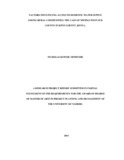| dc.description.abstract | The purpose of this study was to investigate the factors influencing the access to
domestic water supply among rural communities. The study was guided by the
following research objectives i.e to examine the influence of distance from water
sources on access to domestic water supply among the rural community in Mwingi
West Sub County , to access the influence of cost of water to assess the influence of
cost of water on access to domestic water supply among the rural community in
Mwingi West Sub county ,to establish the influence of maintenance of supply
systems on access to domestic water supply in Mwingi west sub county and to
examine the influence of conflict due to competing uses on access to domestic water
supply in Mwingi West Sub County The study employed a descriptive survey design
aimed at analysing the factors influencing access to domestic water supply among the
rural population in Mwingi West Sub-County. The study targeted rural community in
Mwingi West Sub County(630), i.e five county government water officers, 25 water
technical experts and 600 Households in Mwingi West Sub County. A total of 126
respondents participated in the study. Interview schedules and questionnaires were
used to obtain data from the respondents. The data was analysed per each piece of
information and organised as per research questions ,coded the data and developed a
code sheet .The data was analysed using statistical package for social sciences
system (SPSS).For qualitative data, patterns or themes were indentified and for all the
research questions data was analysed descriptively. The analysis showed that conflict
has the strongest positive influence on access to water. In addition, Maintenance of
supply systems are positively correlated to access to water. The correlation matrix
implies that the independent variables: conflict and Maintenance of supply systems
are very crucial determinants of access to water as shown by their strong and positive
relationship with the dependent variable i.e. access to water. The study recommends
that stakeholders such as the government, NGOs, community self help groups and
faith based organizations should come up with strategies on how to improve water
access to the rural community. These strategies may include Construction of more
earth dams, drilling of bore holes, put in place more community water tanks at each
household for harvesting rain water from the house roofs. | en_US |

